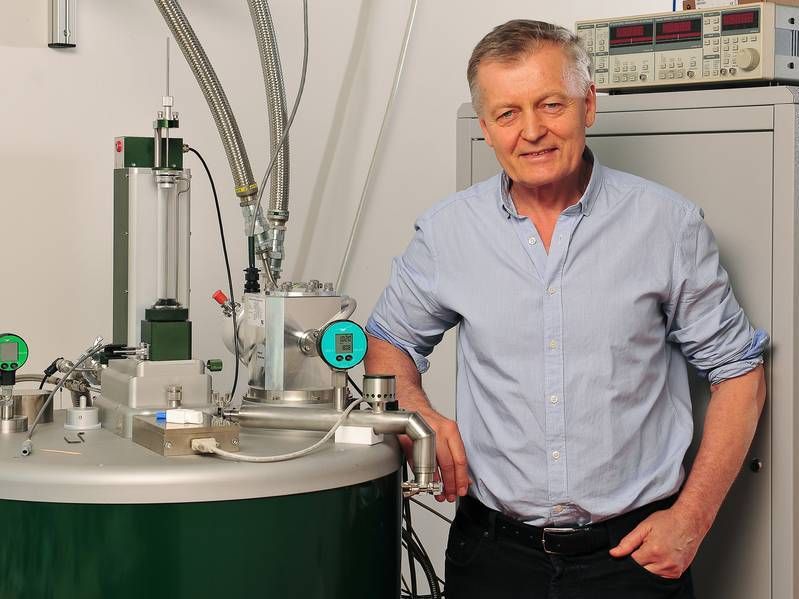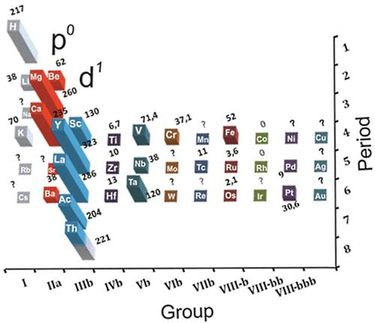Prestigious prize for superconductivity researcher Mikhail Eremets
The American Physical Society (APS) awards Mikhail Eremets the 2020 James C. McGroddy Prize for new materials. As recently announced, the researcher from the Max Planck Institute for Chemistry receives the honor for his "For pioneering studies of hydrides, a new family of high Tc materials, and for the discovery of sulfur hydrides with record value of Tc." Tc stands for the critical temperature or transition temperature, i.e. the temperature at which a material becomes superconductive.

High pressure researcher Mikhail Eremets
MPIC, Carsten Costard
Among Mikhail Eremets´ main achievements in high-pressure research are the discovery of polymeric nitrogen and novel high energy density materials; transparent insulating state of sodium, conductive and semimetallic hydrogen. He with colleagues discovered high temperature superconductivity in hydrogen sulfide with the critical temperature of 203 Kelvin (-70° Celsius)., and then in other hydrides up to the record value of 250 Kelvin (-23° Celsius) in lanthanum hydride.
Mikhail Eremets graduated from Moscow Physical Engineering Institute in 1973 and defended his dissertation in Moscow Institute of General Physics Academy of Sciences of the USSR in 1978. Since 2001 he is working at the Max Planck Institute for Chemistry in Mainz where he leads the High-pressure chemistry and physics group.
The physicist received the Bridgman Award AIRAPT in 2017, Ugo Fano Gold Medal in 2015. He has a Honorary Doctor Degree from Leipzig University, Germany (2016). M. I. Eremets is on the list of Nature’s 10: Ten people who mattered this year (2015). He was Visiting Professor in Research Center for Extreme Materials, Osaka University, Japan 1996-98, Visiting professor ISSP Tokyo University 2008, Visiting professor Chinese Academy of Sciences (2016). He received an Advanced ERC grant (2010) and is member of, , the American Association for the Advancement of Science, the American Physical Society, the American Geophysical Union, the Scientific Research Society Sigma Xi, and the Max Planck Graduate Center with the Johannes Gutenberg University of Mainz.
The James C. McGroddy Prize for New Materials is awarded annually to recognize and encourage outstanding achievement in the science and application of new materials. This shall include the discovery of new classes of materials, the observation of novel phenomena in known materials leading to both fundamentally new applications and scientific insights, and shall also include theoretical and experimental work contributing significantly to the understanding of such phenomena. The prize money is $10,000.
Last year, the prize was awarded to Claudia Felser from the Max Planck Institute for Chemical Physics of Solids in Dresden together with Bogdan Andrei Bernevig (Princeton University) and Xi Dai (Hong Kong University of Science and Technology) for the investigation of materials with special electrical and magnetic properties.
Other news from the department science

Get the chemical industry in your inbox
By submitting this form you agree that LUMITOS AG will send you the newsletter(s) selected above by email. Your data will not be passed on to third parties. Your data will be stored and processed in accordance with our data protection regulations. LUMITOS may contact you by email for the purpose of advertising or market and opinion surveys. You can revoke your consent at any time without giving reasons to LUMITOS AG, Ernst-Augustin-Str. 2, 12489 Berlin, Germany or by e-mail at revoke@lumitos.com with effect for the future. In addition, each email contains a link to unsubscribe from the corresponding newsletter.

























































